新目标九年级英语各单元知识点小结
人教版新目标初三英语九年级第一单元单词语法知识点总结
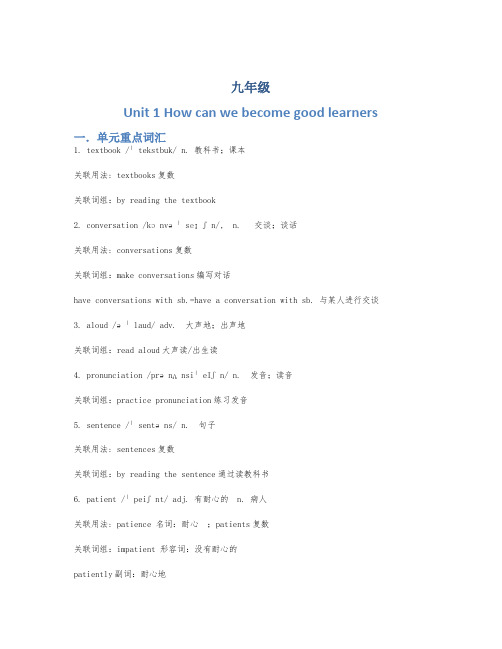
九年级Unit 1 How can we become good learners一.单元重点词汇1.textbook /ˈtekstbuk/ n. 教科书;课本关联用法: textbooks复数关联词组:by reading the textbook2.conversation /kɔnvəˈs eɪʃn/, n. 交谈;谈话关联用法: conversations复数关联词组:make conversations编写对话have conversations with sb.=have a conversation with sb. 与某人进行交谈3.aloud /əˈlaud/ adv. 大声地;出声地关联词组:read aloud大声读/出生读4.pronunciation /prənʌnsiˈeIʃn/ n. 发音;读音关联词组:practice pronunciation练习发音5.sentence /ˈsentəns/ n. 句子关联用法: sentences复数关联词组:by reading the sentence通过读教科书6.patient /ˈpeiʃnt/ adj. 有耐心的 n. 病人关联用法: patience 名词:耐心;patients复数关联词组:impatient 形容词:没有耐心的patiently副词:耐心地be patient with sb.对某人有耐心be patient of sth.对某事能容忍have (no) patience with…对…(没)有耐心lose patience with 对…失去耐心out of patience 没有耐心7.expression /ikˈspreʃn/ n. 表达(方式);表示关联用法:expressions复数关联词组:facial expressions 面部表情8.discover /dIˈskʌvə (r)/ v. 发现;发觉关联用法:discovery 名词:发现9.secret /ˈsi:krət/ n. 秘密;adj. 秘密的;保密的关联用法:secrets复数关联词组:in secret秘密地;keep a secret保密;a secret plan秘密的计划10.look up (在词典,参考书中或通过电脑)查阅;抬头看11.fall in love with 爱上;与⋯⋯相爱12.grammar /ˈgræmə (r)/ n. 语法关联词组:in grammar在语法方面13.repeat /riˈpi:t/ v. 重复;重做关联用法:secrets复数关联词组:repetition名词:重复14.note /nəut/ n. 笔记;记录 v.注意;指出关联用法:notes复数关联词组:please note 清注意;take notes记笔记15.pal /pæl/ n.朋友;伙伴关联词组:penpal笔友16.physics /ˈfiziks/ n. 物理;物理学关联单词:adj. 物理的;身体的;物质的;根据自然规律的,符合自然法则的关联词组:Space Physics 空间物理学物理空间空间物理17.chemistry /ˈkemistri/ n. 化学关联词组:Organic Chemistry 有机化学18.memorize /ˈmeməˌraɪz/ v 记住;记忆关联单词:memory n.记忆关联用法:过去式 memorized过去分词 memorized现在分词 memorizing第三人称单数memorizes典型例句:Have you memorized your lines for the play yet?你记住剧本中的台词了吗?19.pattern /ˈpætn/, /ˈpætən/ n.模式;方式20.pronounce /prəˈnaʊns/ v. 发音关联用法:过去式 pronounced过去分词 pronounced现在分词pronouncing第三人称单数 pronounces关联词组:Pronounce correctly 发音正确正确发音典型例句:I can not pronounce correctly 我不能正确发音21.increase /Inˈkri:s/ v. 增加;增长关联用法:过去式 increased过去分词 increased现在分词 increasing复数 increases第三人称单数 increasesn. 增加;增多;增长关联词组:increase by 增加了;按…增长on the increase 正在增加,正在增长22.speed /spi:d/ n.速度 v.加速关联单词:speeding超速关联用法:过去式 sped或speeded过去分词 sped或speeded现在分词 speeding关联词组:speed up 加速加快速度使加速加快speed limit 速度限制时速限制限速最高车速23.partner /ˈpa:(r)tnə (r)/ n. 搭档;同伴24.born /bɔːn/ v.出生 adj.天生的关联词组:be born with 天生具有born yesterday 乳臭未干典型例句:Swift was born in 1667.斯威夫特生于1667年。
新目标英语九年级unit知识点总结

新目标英语九年级u n i t知识点总结Ability is not the only criterion, but character is the criterion.Unit6 When was it inventedSection A1.invent v. 发明 inventor n. 发明家 invention n. 发明可数名词Edison; a greater inventor; invented many great inventions during his lifetime.2. be used for doing用来做…是被动语态Pens are used for writing. 笔是用来写的..Pens aren’t used for eating. 笔不是用来吃的..3. style 样式;款式 the style of... 的样式/风格be in style=be in season/fashion 时髦;流行 be out of style=be out ofseason/fashion 过时;不流行That’s not my style.那不是我的风格..4.pleasure n. 愉快;高兴my pleasure 我很荣幸;别客气;非常高兴为您服务=It's my pleasure.with plessure 为你效劳;是我的荣幸;乐意效劳用于别人请求你帮忙;表示愿意帮某人做某事My pleasure 或者是It's my pleasure. 是不用谢;不客气的意思..是你帮助了别人之后;别人感谢你时;你的回答用语..注意:It's a pleasure to read this book. 读这本书真是件乐事..1 please v.表请求或要求的语气; “讨好;讨人喜欢;喜欢”“使...高兴;使...满意;使...喜欢”2 pleased adj 高兴;喜欢的;满意的;人主观上感到的满足心理;外部因素引起人发自内心欣慰和愉快be pleased to do sth.高兴做某事 be pleased at/about/with/by 对...感到满意/高兴be pleased that 从句...对...感到满意/高兴3 pleasant adj 令人愉快的天气、时间、旅行令人高兴愉快4 pleased表示人主观上;在心理感到愉快满足;一般为人pleasant表示一个事物“让人感到满意”;主语一般为物..5.such a great invention=so great an inventionsuch+a/an+adj+n=so+adj+a/an+nsuch+adj+nso many/much/few/little 表示数量such little boys 小6.daily adj 每日的;日常的 daily life=everyday lifePeople’s Daily人民日报 China Daily 中国日报weekly 每周的 monthly 每月的 yearly 每年的7.by chance 偶然地;意外地 on purpose 故意地by accident 意外偶然 by mistake 错误地;无意中8.thousand 千表示几千时;基数词+thousand 如果表示不确切的数目时; a few;some;several thousand 用原形thousands of 数百;成千上万的不能与数词连用hundred百 million百万 billion十亿用法类似9. It’s said that...据说;有人说It is believed that...=People believe that...人们认为 It is known that...总所周知It’s thought/supposed that...人们认为 It is reported that...据报道10.fall into 落入掉进 fall down 摔倒The leaf fell into the river. 叶子落入了河里.. She fell down from her bike.11.one of the +adj最高级+n复数形式最....之一12.not…until… 直到…才做… I didn’t go to bed until I finished my work.1 until 用于肯定句中;表示句子的动作一直持续到until短语所表示的时间为止;即表示动作的终点..“直到……时为止”或“在……以前”..主句的谓语动词必须是持续动词非瞬间动词;如live;wait ; last; love; like; stay; work; continueHe ran until he was breathless. 他一直跑到气喘吁吁才停下..He will be working until 5 o'clock. 他将一直工作到五点钟..She was a bank clerk until the war; when she trained as a nurse. 她战前是个银行职员战时受训当了护士..2 until用于否定句中;表示句子的动作直到until短语所表示的时间才开始发生;即表示动作的起点..“直到……才”或“直到……之前……还不”Don't open it until your birthday. 等到你过生日那天再打开..She didn't sleep until eight. 她八点钟才睡觉..I won't stop shouting until you let me go. 你不放我;我就一直喊叫..13. more than =over 超过 less than 少于 more than 300 =over 300 超过30014.the popularity of ... ....的普及Section B1.salty 咸的;含盐的 n+y变成adjcloud wind rain sleep2.in the end =at last; finnaly; 最后;最终;终于句尾;句首at the end of sth;在...的尽头地点;在...结束的时候时间by the end of 到......末;在.....以前;到....为止;后边跟不同的时间会有不同的含义和用法..A 跟将来的时间;就用一般将来时;By the end of next month;I will finish reading this book.到下个月末;我将读完这本书..B 跟现在的时间;就用现在完成时;By the end of this week ;I have written two books .到这个星期末;我已经写了两本书了C 跟过去的时间;用过去完成时By the end of last month ;I had planted thousands of trees.到上个月末;我已经种了数千棵树了3. divide sth into …=separate...into... 将…划分成. 通常指将一个整体分成几个对应相对的部分Let’s divide ourselves into 4groups. 让我们把我们自己划成4组..be divided into...4.teach sb to do sth 教某人做某事teach sb sth 教某人某事teach oneself=learn by oneself 自学5.stop....from doing... 阻止...做某事6.dream of/about 梦想....向往.... have a good dream 做一个好梦 in one’s dream 在某人梦中7. including prep. 包括可以与名词和动名词连用Six people; including a baby; were hurt.include v. 包括This plan includes most of your suggesstions.8.look up to 钦佩;仰慕;仰起头看;将...尊为榜样 We look up to him as a hero.9.encourage sb to do sth 鼓励某人做某事encourage sb in sth 在...方面主张某人的某种行为/故李某人encouragement n. 鼓励;鼓舞10. quite 非常 adv. 与冠词a连用时;冠词a必须放在它的后面quite a beautiful girl 一个漂亮的女孩very 非常 adv. 与冠词a连用时;冠词a必须放在它的前面a very beautiful girl 一个漂亮女孩注:当不与冠词a 连用时;两者可以互用如:I am very happy.= I am quite happy. 我非常高兴..11. be born 出生 He was born in Canada. 他在加拿大出生14.the number of; a number of①the number of …的数量;数目;of后常接名词复数形式;在句中作主语时动词要用单数形式..②a number of许多的=many;number前可用large; small修饰;表程度..作主语时;谓语动词用复数形式..The number of boys in our class is betwenty-two.A number of girls have havelong hair.词义辨析1. create; produce; invent①create指“有目的的把原材料制成新产品”;也指创造出原来不存在或与众不同的事物..②produce指“通过劳动、加工而生产产品”;尤指“工农业产品”..③invent 指通过想象;研究;劳动创造出前所未有的东西;尤指“科技上的发明创造”..2.below; under①below与above相对;指“在….的下方”;表示一件东西的位置低于另一件东西;但不一定在另一件东西的正下方..②under与over相对;表示的范围较窄;表示一件东西的位置垂直在另一件东西下边..3.raise; rise①raise的意思是“提高”、“举起”;是及物动词;既能接宾语;也能用于被动语态..它的宾语一般是头、手、眼、帽、重物以及政治觉悟、生活水平、物价、温度、声音等..此外;raise有“饲养、供养”的意思 ..raise-raised-raised②rise的意思是“上升”、“上涨”;是不及物动词;既不能接宾语;也不能用于被动语态..它的主语一般是日、月、云、烟、热、气、温度计、物价、河水等..指人时;一般指人“站起”、“起床”..rise--rose--risen。
人教版新目标初中英语九年级全一册 知识点总结2单元
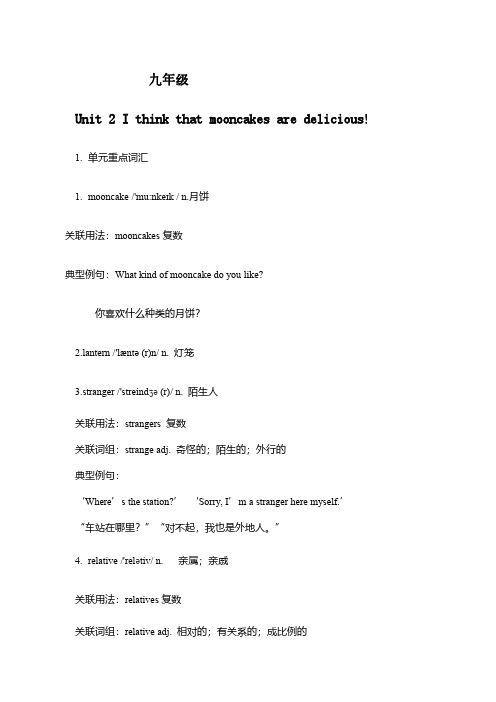
九年级Unit2I think that mooncakes are delicious!1.单元重点词汇1.mooncake/'mu:nkeɪk/n.月饼关联用法:mooncakes复数典型例句:What kind of mooncake do you like?你喜欢什么种类的月饼?ntern/'læntə(r)n/n.灯笼3.stranger/'streindʒə(r)/n.陌生人关联用法:strangers复数关联词组:strange adj.奇怪的;陌生的;外行的典型例句:‘Where’s the station?’‘Sorry,I’m a stranger here myself.’“车站在哪里?”“对不起,我也是外地人。
”4.relative/'relətiv/n.亲属;亲戚关联用法:relatives复数关联词组:relative adj.相对的;有关系的;成比例的5.put on增加(体重);发胖关联用法:put on:穿上;上演;增加;假装;使…上场关联词组:put away储存(钱);储存…备用;储蓄put back拨回;向后移put down写下;记下;镇压put forward提出(意见、建议)put in打断;插嘴put off延期;推迟典型例句:She put on her coat and went out.她穿上外套,出去了。
Inactive people often put on weight later in life.不好动的人常常会在今后的生活中发胖。
6.pound/paund/n.磅(重量单位);英镑7.folk/fəul k/adj.民间的;民俗的8.goddess/'gɔdes/n.女神9.whoever/huːˈevə/pron.无论谁;不管什么人关联用法:whoever可以写成no matter who典型例句:I’ll take whoever wants to go.谁想去我就带谁去。
新目标九年级英语单元知识点、短语及句型总结
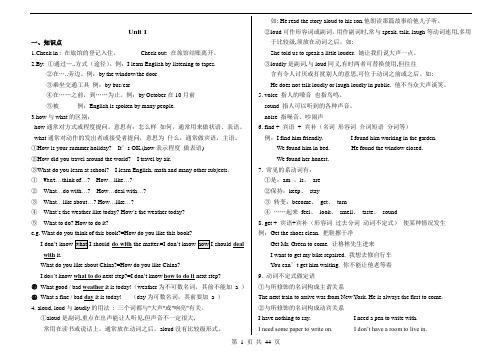
常用于句末 如:I eat a lot. 我吃了许多。
如:I’m too tired to say anything. 我太累了,什么都不想说。 I like milk very much. I don’t like coffee at all. 我非常喜欢牛奶。我一点也不喜欢咖啡。 not 经常可以和助动词结合在一起,at all 则放在句尾 26.be / get excited about sth.=== be / get excited about doing sth. === be excited to do sth. 对…感兴奋 如: I am / get excited about going to Beijing.=== I am excited to go to Beijing. 我对去北京感到兴奋。 27. ① end up doing sth ② end up with sth. 28. first of all 首先 . to begin with 一开始 later on 后来、随 29. also 也、而且(用于肯定句)常在句子的中间 第 2 页 共 44 页 终止做某事,结束做某事 以„结束 如: 如: The party ended up singing. 晚会以唱歌而结束。 The party ended会以她的歌唱而告终。
e.g. What do you think of this book?=How do you like this book? I don’t know what I should do with the matter.=I don’t know how I should deal with it. What do you like about China?=How do you like China? I don’t know what to do next step?=I don’t know how to do it next step? ㊣ What good / bad weather it is today!(weather 为不可数名词,其前不能加 a ) ㊣ What a fine / bad day it is today! (day 为可数名词,其前要加 a ) 4. aloud, loud 与 loudly 的用法 : 三个词都与"大声"或"响亮"有关。 ①aloud 是副词,重点在出声能让人听见,但声音不一定很大, 常用在读书或说话上。通常放在动词之后。aloud 没有比较级形式。
新目标人教版九年级英语(10—14单元)知识点总结
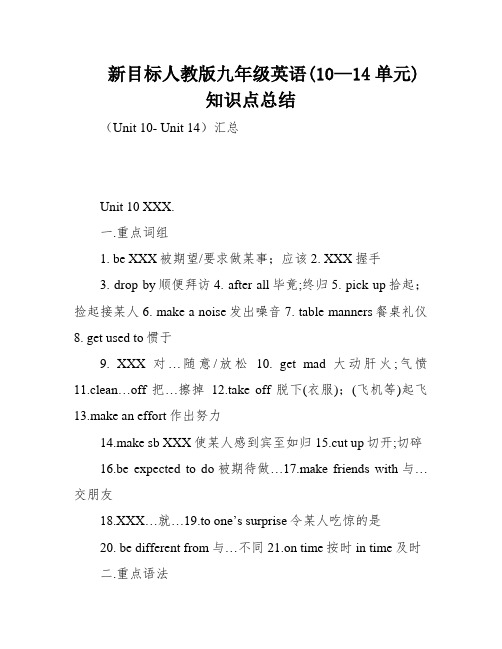
新目标人教版九年级英语(10—14单元)知识点总结(Unit 10- Unit 14)汇总Unit 10 XXX.一.重点词组1. be XXX被期望/要求做某事;应该2. XXX握手3. drop by顺便拜访4. after all毕竟;终归5. pick up拾起;捡起接某人6. make a noise发出噪音7. table manners餐桌礼仪8. get used to惯于9. XXX对…随意/放松10. get mad大动肝火;气愤11.clean…off把…擦掉12.take off脱下(衣服);(飞机等)起飞13.make an effort作出努力14.make sb XXX使某人感到宾至如归15.cut up切开;切碎16.be expected to do被期待做…17.make friends with与…交朋友18.XXX…就…19.to one’s surprise令某人吃惊的是20. be different from与…不同21.on time按时in time及时二.重点语法1.(1)suppose:猜测;假定XXX透露施展阐发“推测;假定”,that可省例:XXX.(2)be XXX被期望做某事,应该做某事。
相当于should 和ought to例:XXX.XXX to say hello to the foreigners.【练】You are supposed _____ hands when you meet for the first time.A. to shakeB. shakeC. shakingD. shook2. make plans to do == plan to do.打算做某事例She has made plans to go to Beijing.=She has planed to go to Beijing.go out of one’s way to do特意,专门做某事例:He went out of his way to make me happy.3. In Switzerland,it’XXX.阐发:it是方式主语,不定式是真正的主语。
(完整版)人教版新目标英语九年级Unit9单元知识点小结
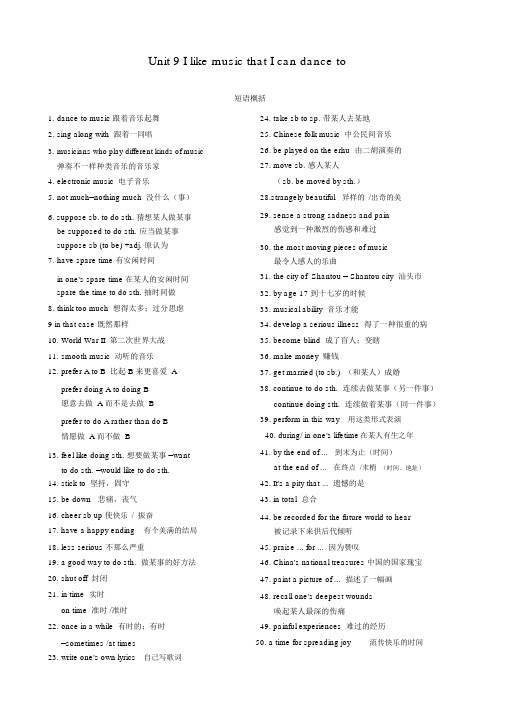
Unit 9 I like music that I can dance to1.dance to music 跟着音乐起舞2.sing along with 跟着一同唱3.musicians who play different kinds of music弹奏不一样种类音乐的音乐家4.electronic music 电子音乐5.not much=nothing much 没什么(事)6.suppose sb. to do sth. 猜想某人做某事be supposed to do sth. 应当做某事suppose sb (to be) +adj. 原认为7.have spare time 有安闲时间in one's spare time 在某人的安闲时间spare the time to do sth. 抽时间做8.think too much 想得太多;过分思虑9 in that case 既然那样10.World War II 第二次世界大战11.smooth music 动听的音乐12.prefer A to B 比起 B 来更喜爱 Aprefer doing A to doing B愿意去做 A 而不是去做 Bprefer to do A rather than do B情愿做 A 而不做 B13.feel like doing sth. 想要做某事 =wantto do sth. =would like to do sth.14.stick to 坚持,固守15.be down 悲痛,丧气16.cheer sb up 使快乐/振奋17. have a happy ending有个美满的结局18.less serious 不那么严重19.a good way to do sth. 做某事的好方法20.shut off 封闭21.in time 实时on time 准时 /准时22.once in a while 有时的;有时=sometimes /at times23. write one's own lyrics自己写歌词短语概括24.take sb to sp. 带某人去某地25.Chinese folk music 中公民间音乐26.be played on the erhu 由二胡演奏的27.move sb. 感人某人(sb. be moved by sth.)28.strangely beautiful异样的/出奇的美29.sense a strong sadness and pain感觉到一种激烈的伤感和难过30.the most moving pieces of music最令人感人的乐曲31.the city of Shantou = Shantou city 汕头市32.by age 17 到十七岁的时候33.musical ability 音乐才能34.develop a serious illness 得了一种很重的病35.become blind 成了盲人;变瞎36.make money 赚钱37.get married (to sb.) (和某人)成婚38.continue to do sth. 连续去做某事(另一件事)continue doing sth. 连续做着某事(同一件事)39. perform in this way用这类形式表演40. during/ in one's lifetime在某人有生之年41.by the end of ... 到末为止(时间)at the end of ... 在终点/末梢(时间、地址)42.It's a pity that ... 遗憾的是43.in total 总合44.be recorded for the future world to hear被记录下来供后代倾听45.praise ... for ... 因为赞叹46.China's national treasures 中国的国家瑰宝47.paint a picture of ... 描述了一幅画48.recall one's deepest wounds唤起某人最深的伤痛49.painful experiences 难过的经历50. a time for spreading joy流传快乐的时间句子重难点分析1. Hmm, depends which movie.嗯,那要看是哪部电影了。
人教版新目标英语九年级-Unit10单元知识点小结
Unit10 You're supposed to shake hands.重点(zh òngdi ǎn)短语句子(j ù zi)重难点解析 1. That's how people in Japan are expected to greet each other.这就是在日本人们应该互相问候(wènhòu)的方式。
⑴greet v. 问候(wènhòu),打招呼;迎接(= welcome / say hello to )常与with ... 或by doing ...搭配(dāpèi),表示“以…方式问候/打招呼”It's a friendly way to greet each other. 这是一种互致友好问候的方式。
She rose to greet her guests. 她起身迎接客人。
⑵expect sb. to do sth. 期望某人做某事 be expected to do sth. 被期望某事His parents expect him to see them in a short time. 父母期望他马上来看望他们。
She is expected to finish the job on time. 期望她按时完成工作。
※练一练① The host ________________________ at the gate. 主人在大门口迎接我们。
② He _______________________________ "good morning". 他向她打招呼说 “早上好”。
③ She _________________________ a friendly smile. 她向我微笑致意。
1. for the first time 第一次2. the first time ... 第一次……3. be supposed to do sth. 应该做某事4. be expected to do sth. 被期望做某事5. shake hands with sb. 和某人握手6. hold out 伸出7. to one's surprise 令/使某人意外的是8. be relaxed about ... 对……感到放松9. rush around 匆忙赶路10. value the time 珍惜时间11. in one's everyday life 在日常生活中12. drop by 顺便拜访;随便进入13. after all 毕竟、终究14. get mad with sb. 生某人的气15. make an/every effort to do sth. 努力做某事16. heavy traffic 繁忙的交通17. It's no big deal! 小事一桩!18 clean ... off 把……擦掉19. be worth doing 值得做20. table manners 餐桌礼仪 21. stick ... into ... 把……伸进…… 22. take off 脱下;(飞机)起飞 23. as ... as possible 尽可能…… 24. be worth the trouble 值得麻烦 25. point at 指着(侧重对象) 26. point to 指向(强调方向) 27. go out of one's way to do sth. 特地/努力做某事 28. make sb. feel at home 使……感到宾至如归 29. be comfortable doing sth. 自在地做某事 30. feel good about doing sth. 对做某事感觉良好 31. behave well / badly 表现好/不好 32. good / bad behavior 良好/恶劣举止 33. Chinese customs 中国的习俗 34. at the table 在桌上 35. at table 就餐 36. show up 出现;显现;赶到;使……出丑2. Where I'm from, we are pretty relaxed about time. 我来的那个地方(dìfāng)对时间非常放松。
初中英语人教新目标九年级全册Unit 8—Unit 14语法知识点总结
九年级英语全册单元语法知识点Unit 8:It must belong to Carla.第八单元的语法重点是:情态动词表推测。
情态动词表推测情态动词 must,may,might,could,may,can 表示推测含义与用法后面都接动词原形,都可以表示对现在情况的揣测和推断但他们含义有所不同。
① must 一定,肯定(100%可能性)② may,might,could 有可能,也许(20%、80%可能性)③ can't 不可能,不会(可能性几乎为零)如:The dictionary must be mine.It has my name on it.The hair band can't be Bob's.After all,he is boy!【直击中考】1.【吉林长春】20.-Are the glasses Tim's?-No,they _______ be his.He doesn't wear glasses.A.mustB.canC.mustn'tD.can't2.【江苏宿迁】5.-Excuse me,is this the way to No.10 Middle School?-Oh,sory.I'm not sure.But it ______ be.A.mustB.shouldC.needD.mayUnit 9:I like music that I can dance to.第九单元的语法重点是:定语从句。
定语从句★定语从句:在复合句中,修饰某一名词或代词的从句叫做定语从句。
定语从句可以分为限制性定语从句和非限制性定语从句。
本单元主要学习由 who、that、which 引导的限制性定语从句。
★先行词:被定语从句所修饰的名词或代词称为先行词。
★关系代词:引导定语从句的关联词称为关系代词。
关系代词在定语从句中有三个作用:(1)引导定语从句;(2)代替先行词;(3)在定语从句中充当一个成分。
新目标九级Units重要知识点总结
重点词组1、would like 想要2、consider doing考虑做某事3、provide sb. with sth 供应某人某物=provide sth for sb.4、clean up 打扫5、cheer (sb.) up使(某人)高兴、振作6、give out 分发7、not only …but also不仅•…而且…8、inventv.发明;9、be used for doing 用来做…10、by the time直到…时候重点句型1.1 like music that I can dance to.2.Where would you like to visit ?3.I ' ll help clean up the city parks.4.When was the car inven ted?5.By the time she went outside, the bus had already left.重点难点解读:1)重点单词分析:Unit 61.prefer动词更喜欢宁愿1)prefer sth.更喜欢某事I prefer English.我更喜欢英语。
2)prefer doing/ to do 宁愿做某事I prefer sitting/ to sit.我宁愿坐着。
3)prefer sth to sth.同…相比更喜欢…I prefer dogs to cats.与猫相比我更喜欢狗。
4)prefer doing to doing宁愿做某事而不愿做某事I prefer walking to sitting. 我宁愿走路也不愿坐着。
2.dance to sth.随着…跳舞She likes dancing to the music.她喜欢随着音乐而跳舞。
3.remind sb. of sb./sth.提醒使…记起….This song remi nds him of his mother.这首歌使他记起了他的妈妈。
人教版新目标初中英语九年级全一册 知识点总结1单元
九年级Unit1How can we become good learners1.单元重点词汇1.textbook/ˈtekstbuk/n.教科书;课本关联用法:textbooks复数关联词组:by reading the textbook2.conversation/kɔnvəˈs eɪʃn/,n.交谈;谈话关联用法:conversations复数关联词组:make conversations编写对话have conversations with sb.=have a conversation with sb.与某人进行交谈3.aloud/əˈlaud/adv.大声地;出声地关联词组:read aloud大声读/出生读4.pronunciation/prənʌnsiˈeIʃn/n.发音;读音关联词组:practice pronunciation练习发音5.sentence/ˈsentəns/n.句子关联用法:sentences复数关联词组:by reading the sentence通过读教科书6.patient/ˈpeiʃnt/adj.有耐心的n.病人关联用法:patience名词:耐心;patients复数关联词组:impatient形容词:没有耐心的patiently副词:耐心地be patient with sb.对某人有耐心be patient of sth.对某事能容忍have(no)patience with…对…(没)有耐心lose patience with对…失去耐心out of patience没有耐心7.expression/ikˈspreʃn/n.表达(方式);表示关联用法:expressions复数关联词组:facial expressions面部表情8.discover/dIˈskʌvə(r)/v.发现;发觉关联用法:discovery名词:发现9.secret/ˈsi:krət/n.秘密;adj.秘密的;保密的关联用法:secrets复数关联词组:in secret秘密地;keep a secret保密;a secret plan秘密的计划10.look up(在词典,参考书中或通过电脑)查阅;抬头看11.fall in love with爱上;与⋯⋯相爱12.grammar/ˈgræmə(r)/n.语法关联词组:in grammar在语法方面13.repeat/riˈpi:t/v.重复;重做关联用法:secrets复数关联词组:repetition名词:重复14.note/nəut/n.笔记;记录v.注意;指出关联用法:notes复数关联词组:please note清注意;take notes记笔记15.pal/pæl/n.朋友;伙伴关联词组:pen pal笔友16.physics/ˈfiziks/n.物理;物理学关联单词:adj.物理的;身体的;物质的;根据自然规律的,符合自然法则的关联词组:Space Physics空间物理学物理空间空间物理17.chemistry/ˈkemistri/n.化学关联词组:Organic Chemistry有机化学18.memorize/ˈmeməˌraɪz/v记住;记忆关联单词:memory n.记忆关联用法:过去式memorized过去分词memorized现在分词memorizing第三人称单数memorizes典型例句:Have you memorized your lines for the play yet?你记住剧本中的台词了吗?19.pattern/ˈpætn/,/ˈpætən/n.模式;方式20.pronounce/prəˈnaʊns/v.发音关联用法:过去式pronounced过去分词pronounced现在分词pronouncing第三人称单数pronounces关联词组:Pronounce correctly发音正确正确发音典型例句:I can not pronounce correctly我不能正确发音21.increase/Inˈkri:s/v.增加;增长关联用法:过去式increased过去分词increased现在分词increasing复数increases第三人称单数increasesn.增加;增多;增长关联词组:increase by增加了;按…增长on the increase正在增加,正在增长22.speed/spi:d/n.速度v.加速关联单词:speeding超速关联用法:过去式sped或speeded过去分词sped或speeded现在分词speeding 关联词组:speed up加速加快速度使加速加快speed limit速度限制时速限制限速最高车速23.partner/ˈpa:(r)tnə(r)/n.搭档;同伴24.born/bɔːn/v.出生adj.天生的关联词组:be born with天生具有born yesterday乳臭未干典型例句:Swift was born in1667.斯威夫特生于1667年。
- 1、下载文档前请自行甄别文档内容的完整性,平台不提供额外的编辑、内容补充、找答案等附加服务。
- 2、"仅部分预览"的文档,不可在线预览部分如存在完整性等问题,可反馈申请退款(可完整预览的文档不适用该条件!)。
- 3、如文档侵犯您的权益,请联系客服反馈,我们会尽快为您处理(人工客服工作时间:9:00-18:30)。
新目标九年级英语各单元知识点小结Unit11. by + doing通过……方式如:by studying with a groupby 还可以表示:“在…旁”、“靠近”、“在…期间”、“用”、“经过”、“乘车”等如:I live by the river.I have to go back by ten o’clock.The thief entered the room by the window.The student went to park by bus.2. talk about 谈论,议论,讨论如:The students often talk about movie after class. 学生们常常在课后讨论电影。
talk to sb. = talk with sb. 与某人说话3. 提建议的句子:①What/ how about +doing sth.? 如:What/ How about going shopping?②Why don’t you + do sth.?如:Why don’t you go shopping?③Why not + do sth. ? 如:Why not go shopping?④Let’s + do sth. 如: Let’s go shopping⑤Shall we/ I + do sth.?如:Shall we/ I go shopping?4. a lot 许多常用于句末如:I eat a lot. 我吃了许多。
5. too…to 太…而不能常用的句型too + adj./adv. + to do sth.如:I’m too tired to say anything. 我太累了,什么都不想说。
6. aloud, loud与loudly的用法三个词都与"大声"或"响亮"有关。
①aloud是副词,重点在出声能让人听见,但声音不一定很大,常用在读书或说话上。
通常放在动词之后。
aloud没有比较级形式。
如: He read the story aloud to his son. 他朗读那篇故事给他儿子听。
②loud可作形容词或副词。
用作副词时,常与speak, talk, laugh等动词连用,多用于比较级,须放在动词之后。
如: She told us to speak a little louder. 她让我们说大声一点。
③loudly是副词,与loud同义,有时两者可替换使用,但往往含有令人讨厌或打扰别人的意思,可位于动词之前或之后。
如: He does not talk loudly or laugh loudly in public. 他不当众大声谈笑。
7. not …at all 一点也不根本不如:I like milk very much. I don’t like coffee at all. 我非常喜欢牛奶。
我一点也不喜欢咖啡。
not经常可以和助动词结合在一起,at all 则放在句尾。
8. be / get excited about sth.= be / get excited about doing sth.= be excited to do sth. 对…感到兴奋如:I am / get excited about going to Beijing.=I am excited to go to Beijing. 我对去北京感到兴奋。
9. ①end up doing sth 终止做某事,结束做某事如:The party ended up singing. 晚会以唱歌而结束。
②end up with sth. 以…结束如:The party ended up with her singing. 晚会以她的歌唱而告终。
1 first of all 首先. to begin with 一开始later on 后来、随后也、而且(用于肯定句)常在句子中间(实义动词之前,be动词之后)也(用于否定句)常在句末(用于肯定句) 常在句末12. make mistakes 犯错如:I often make mistakes. 我经常犯错。
make a mistake 犯一个错误如I have made a mistake. 我已经犯了一个错误。
13. laugh at sb. 笑话;取笑(某人)如:Don’t laugh at me! 不要取笑我!Make a joke on sb 和某人开玩笑14. take notes 做笔记,做记录15. enjoy doing sth .喜欢做…乐意做…如:She enjoys playing football. 她喜欢踢足球。
enjoy oneself 过得愉快如:He enjoyed himself. 他过得很愉快。
16. native speaker 说本族语的人17. make up 组成、构成18. one of +(the+ 形容词最高级)+名词复数形式…其中之一如: She is one of the most popular teachers. 她是最受欢迎的教师之一。
19. It’s +形容词+(for sb. ) to do sth. (对于某人来说)做某事…如:It’s difficult (for me ) to study English. 对于我来说学习英语太难了。
句中的it 是形式主语,真正的主语是to study English20.df practice doing 练习做某事如:She often practice speaking English. 她经常练习说英语。
21. decide to do sth. 决定做某事如:Li Lei has decided to go to Beijing . 李雷已经决定去北京。
22. unless 假如不,除非引导条件状语从句如:You will fail unless you work hard..假如你不努力你会失败。
I won’t write unless he writes first. 除非他先写要不我不写23. deal with 处理如:I dealt with a lot of problem.24. worry about sb./ sth. 担心某人/ 某事如:Mother worried about his son just now. 妈妈刚才很担心他的儿子。
25. be angry with sb. 对某人生气如:I was angry with her. 我对她生气。
26. perhaps = maybe 也许27. go by (时间) 过去如: Two years went by. 两年过去了。
看见某人正在做某事强调动作正在发生看见某人在做某事如: She saw him drawing a picture in the classroom. 她看见他正在教室里画画。
29. each other 彼此互相30. regard…as …把……看作为……如:The boys regarded Anna as a fool. 这些男孩把安娜看成傻瓜了。
31. too many许多修饰可数名词复数如:too many girlstoo much许多修饰不可数名词如:too much milkmuch too太修饰形容词如:much too beautiful32. change …into … 将……变为……如:The magician changed the pen into a book. 这个魔术师将钢笔变为一本书。
33. with the help of sb. = with one ’s help 在某人的帮助下如:with the help of Li Lei = with Li Lei ’s help 在李雷的帮助下34. compare …to … 把……与……相比如:Last summer I went to Beijing. This year I ’m going to Shanghai instead.去年夏天我去了北京, 今年我将要去上海。
I will go instead of you. 我将代替你去。
He stayed at home instead of going swimming. 他呆在家里而不是去游泳。
Unit21. used to do sth. 过去常常做某事否定形式: didn ’t use to do sth. / used not to do sth.如:He used to play football after school. 放学后他过去常常踢足球。
Did he use to play football? Yes, I did. No, I didn ’t.He didn ’t use to smoke. 他过去不吸烟。
2. 反意疑问句①肯定陈述句+否定提问 如:Lily is a student, isn ’t she?Lily will go to China, won ’t she?②否定陈述句+肯定提问 如:She doesn ’t come from China, does she?You haven ’t finished homework, have you?③提问部分用代词而不用名词如:Lily is a student, isn ’t she?④陈述句中含有否定意义的词,如little, few, never, nothing, hardly 等。
其反意疑问句用肯定式。
如:He knows little English, does he ? 他一点也不懂英语,不是吗? They hardly understood it, did they ? 他们几乎不明白,不是吗?3. play the piano 弹钢琴如:He is interested in math, but he isn ’t interested in speaking English.他对数学感兴趣,但是他对说英语不感兴趣。
5. interest ed adj. 感兴趣的,指人对某事物感兴趣,往往主语是人 interest ing adj.有趣的,指某事物/某人具有趣味,主语往往是物6. still 仍然,还:①用在be 动词的后面 如:I ’m still a student.②用在行为动词的前面 如:I still love him.8. I am terrified of the dog.如:I am terrified of speaking.9. on 副词,表示(电灯、电视、机械等)在运转中/打开,其反义词off.with the light on 灯开着10. walk to somewhere 步行到某处 walk to school 步行到学校11.spend 动词,表示“花费金钱、时间”①spend…on sth. 在某事上花费(金钱、时间)②spend…doing sth.花费(金钱、时间)去做某事如:He spends too much time on clothes. 他在衣着上花费了太多的时间。
